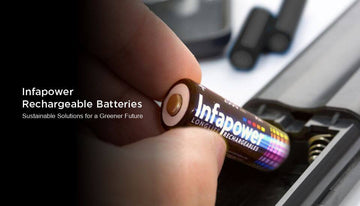Small decisions that have significant environmental benefits now play an essential role in building a sustainable planet. Rechargeable batteries in home appliances make an excellent sustainable choice among available options. Rechargeable batteries surpass single-use batteries in providing extended advantages. Environmental consciousness among consumers now prompts them to choose rechargeable batteries as a way to build a sustainable future for all. The article evaluates the main eco-friendly advantages that rechargeable batteries bring to everyday appliances.
Exploring the Top Eco-Friendly Benefits of Using Rechargeable Batteries in Appliances
1. Reducing Battery Waste and Landfill Impact
Disposal batteries are a big contributor to waste occupying landfills. Billions of single-use batteries are dumped each year. This leads to the exposure of poisonous chemicals into the environment. Each rechargeable battery can be reused a thousand times before disposal. This results in a drastic reduction in the number of batteries that fill up landfills while minimising the threat their waste poses to the environment.
Fewer batteries disposed of mean fewer chances of soil and water contamination due to dumped batteries. Opting for rechargeable batteries would mean these individuals and businesses have played their parts in tackling landfill congestion and working toward sustainable waste management.
2. Conserving Natural Resources and Energy
Degradation of the environment is caused by mining. This often results in habitat destruction, deforestation, and pollution. Using rechargeable batteries decreases the demand for finite natural resources with reduced extraction rates that would otherwise cause more degradation to the sites of extraction.
It also means that, over their life span, rechargeable batteries demand less manufacturing energy compared to making single-use batteries. Reducing reliance on nonrenewable resources also ensures more sustainable future supply chains.
3. Lowering Greenhouse Gas Emissions
The manufacture and transport of disposable batteries emit huge amounts of carbon into the environment. As rechargeable batteries last longer compared to single-use batteries, fewer requirements will mean reduced production and distribution emissions. Charging batteries from renewable sources cuts down greenhouse emissions further, giving them the edge in terms of sustainability. Such chargers produce a multiplier effect on improving the carbon footprint.
As climate change continues to be an overarching concern worldwide, the adoption of rechargeables has proven to be the surest way through which individuals can cut down their carbon footprints and contribute positively toward environmental efforts.
4. Reducing Chemical Pollution and Toxic Waste
Conventional disposable batteries contain very toxic materials. This can seep into the soil and water bodies when they are improperly disposed of. These pollutants can harm animals and human health. In contrast to single-use batteries, rechargeable batteries have longer lives. They also use safer materials, need less frequent disposal, and release fewer harmful substances into the environment.
Also, suitable recycling schemes for rechargeable batteries minimise pollution from these discarded batteries and thereby contribute to environmental sustainability. Combined with responsible disposal and recycling of rechargeable batteries, pollution is, thus, curtailed, contributing to biodiversity conservation.
5. Promoting Energy Efficiency and Cost Savings
Rechargeable batteries do not waste the resources that single-use batteries waste. They require less energy to manufacture each time they are used. Also, they can be recharged many times with very little loss of performance. Furthermore, rechargeable batteries save consumers money in the long run and reduce overall energy consumption in battery production.
Besides, a combination of solar and other renewable energy sources with rechargeable batteries makes them eco-friendly. By utilising rechargeable battery technology, people and businesses cut energy costs. Thus, they lessen their impact on the planet.
6. Encouraging Sustainable Consumer Habits
The use of rechargeable batteries establishes an ideology of sustainability among users. By choosing reusable and energy-efficient options, users contribute towards cutting down on volumes of waste and environmental damage. The awareness encourages manufacturers to invest in earth-friendly technologies.
Governments and organisations, likewise, are incentivizing the proper use of batteries through mandates and legislative regulations championing the switch to rechargeable varieties. The promotion of the practice of rechargeables by consumers sets the trend towards such eco-conscientious decisions in everyday life, thus ensuring long-term environmental conservation.
Why Choose Rechargeable Batteries from Infapower?
Infapower rechargeable batteries promise dependable, long-lasting, and eco-friendly usage. They are meant for high performance, allowing users extended power cycles while lessening the need for constant replacement. Infapower batteries are cost-effective, providing savings over time while also reducing waste in the environment. Infapowers are technologically well-advanced. They provide a steady power supply and can serve many devices. If you buy Infapower products, you are supporting sustainability since they reduce landfill waste and preserve natural resources. For an eco-efficient power solution, choose Infapower rechargeable batteries, which are a wise investment for home and workstation use.
Conclusion
One simple yet powerful strategy to support environmental sustainability is the shift to rechargeable batteries. In addition to helping the environment, switching offers consumers dependable performance and long-term savings. Selecting rechargeable batteries is a minor adjustment that has a big environmental impact. Buy rechargeable batteries from Infapower today!



